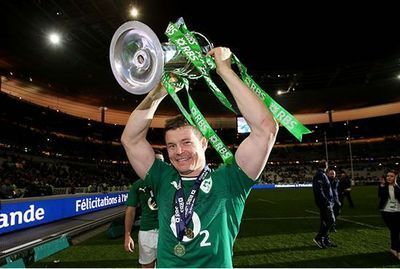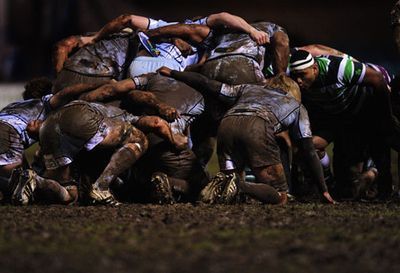Muddied oafs and Irish triumph
Brian O'Driscoll celebrates. NPHO/Dan Sheridan
By ADRIAN TAHOURDIN
This post is mostly about rugby, so please, non-rugby fans, feel free to stop reading now.
Ireland won the 2014 Six Nations championship on Saturday, just in time for St Patrick’s Day today, by narrowly defeating France (22–20) at the Stade de France in Paris. (England had comfortably beaten Italy in Rome earlier in the day, and therefore finished with the same number of wins as Ireland but with an inferior points difference.)
I hadn’t watched any of the Six Nations matches this year, but sensed that the France–Ireland game would be one not to miss. I was right: it was a pulsating match, with both teams giving it their absolute all. Spice was added by the fact that it was to be 35-year-old Brian O’Driscoll’s last match in Irish colours. The buccaneering centre went out with a Man of the Match award and all sorts of records to his name: most number of Test caps (141), most tries in the Six Nations (26) etc. The game will miss him and Ireland will certainly miss him: he’s a once-in-a-generation player.
O'Driscoll scored a hat-trick of tries the last time Ireland won in Paris in 2000, carving up the French defence with pace and swerve.
Stu Forster/Getty Images
And how the game has changed. In spite of the photo above, it’s now less a case of muddied oafs (to borrow the title of Richard Beard’s 2003 book) lumbering up the pitch, while the “Jessies at the back”, as a former England forward once labelled them, nimbly evade tackles. International pitches are invariably pristine rather than mudbaths. Forwards and backs have become almost physically indistinguishable, all rippling muscle and thick necks, many weighing well over 90 kgs.
You could say that the professionalization of the game in the 1990s drew some of the romance out of it (think of Wales’s rampaging team of the mid-70s, all imagination and guile). Teams now have the vast array of technicians we see in other, more professionally established sports: specialist coaches, dieticians, psychologists; laptops are amply in evidence, in an attempt to reduce the error count in players’ performances. It doesn’t always work though: late in the France–Ireland match on Saturday the hosts had a great opportunity to score a winning try but fluffed it with an (illegitimate) forward pass. No amount of psychologizing, it seems, can counter the pressure of the moment. Which is reassuring surely.
In a TLS review of Richard Beard’s book the late Mick Imlah struggled to find many literary connections with the elliptical ball game: he came up with Kipling, Wodehouse, Conan Doyle, John Buchan. One might add Imlah himself, with his elegy for his friend Stephen Boyd: "So we put you at full-back, farthest away / From the kick-off, at least; you had arrived / In a pair of khaki shorts (we played in black), / Which in a private reference to the kilt / You wore with nothing underneath, and kept / Your heavy-duty glasses on as well". In his review Imlah derided the hideous moniker “Team England” as well as English players’ tendency to refer to “the guys”. This last habit has, alas, spread, as the charming French coach Philippe Saint-André spoke after last Saturday’s match of how “Ze guyz was being criticized” in the French press.
It’s unquestionably true that English rugby teams (“the guys”) have often had an image problem: dourness and lack of flair (a term traditionally ascribed by commentators to French teams, as in “Gallic flair”) complemented by occasional arrogance; then there are the rah-rah supporters with their unofficial “Swing Low” anthem and chunky sweaters.
The Six Nations tournament, made up of, along with France and the newest competitor Italy, four teams from the British Isles – England, Ireland, Scotland and Wales – has often had a certain edge: how Scotland love to beat England (it doesn’t happen very often). As do Wales of course. In February 2007, when their usual home stadium Lansdowne Road was being redeveloped, the Irish team hosted England at Croke Park, apparently the third largest stadium in Europe. It was also the scene in November 1920 of a massacre by the Royal Irish Constabulary during a Gaelic football match.The match in 2007 passed off without incident, even with the playing of the anthem “God Save the Queen” (I guess that's the "English" national anthem – how complicated it all is). Ireland won by a record margin of 43–13. Their captain that day was Brian O’Driscoll.
Peter Stothard's Blog
- Peter Stothard's profile
- 30 followers





